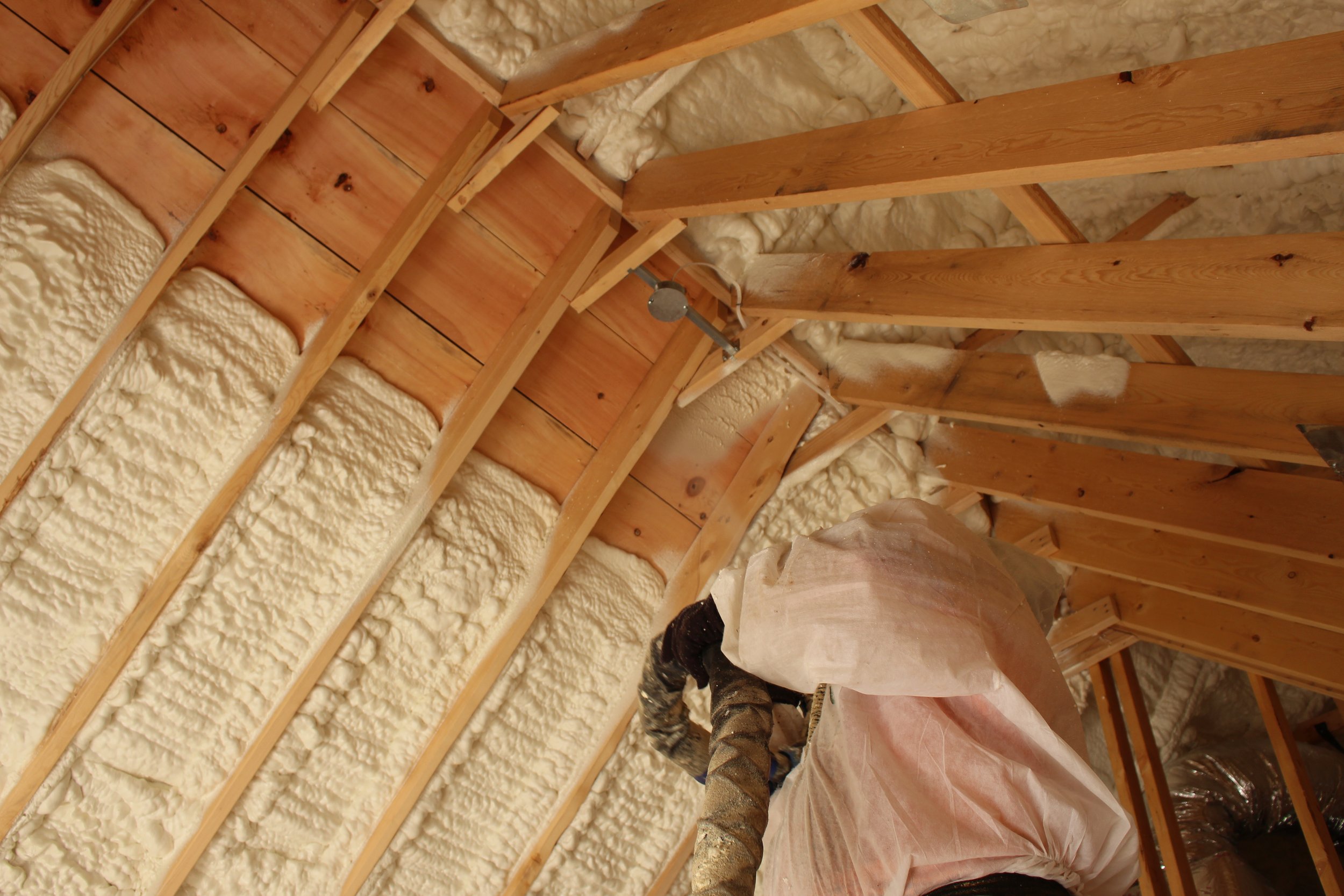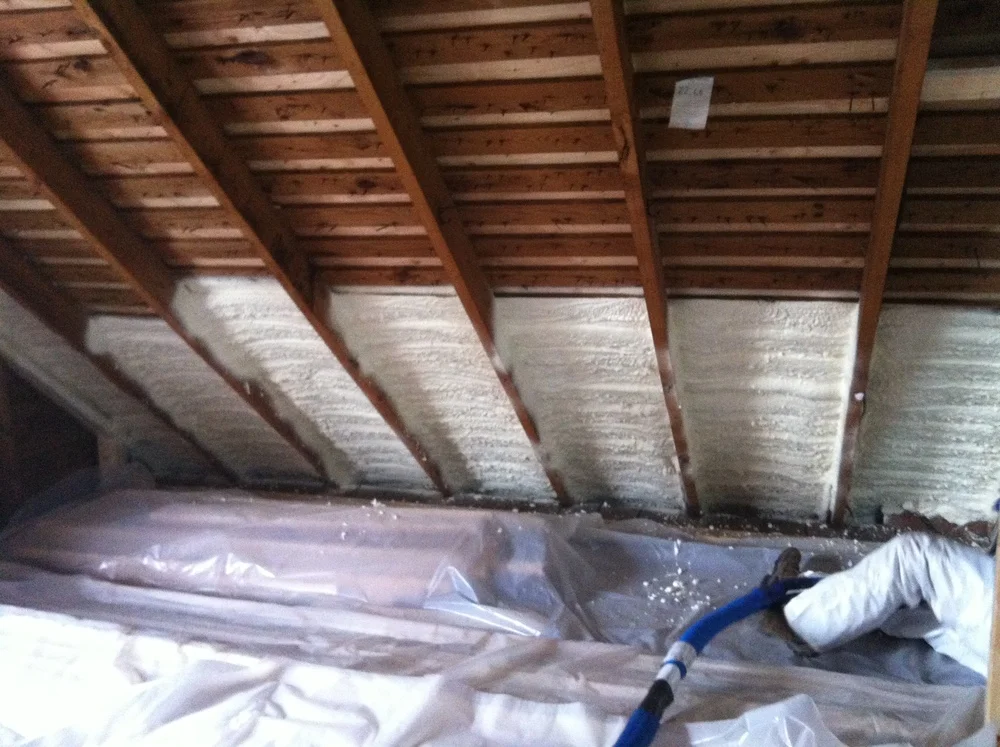The Ecological Impact of Spray Foam: Sustainability Factors To Consider
The Ecological Impact of Spray Foam: Sustainability Factors To Consider
Blog Article
Spray Foam: The Ultimate Remedy for Air Sealing and Insulation
Spray foam insulation has arised as a leading option for efficient air sealing and thermal insulation, providing a special combination of properties that establish it apart from standard methods. Comprehending the complete range of its advantages, setup processes, and contrasts with other insulation kinds is essential for making informed decisions.
What Is Spray Foam?
Spray foam is a functional insulation material that incorporates the concepts of air securing and thermal resistance to improve power efficiency in structures. Composed primarily of polyurethane or other comparable substances, spray foam is used as a fluid that expands upon contact with surface areas, producing a solid, continuous layer of insulation. This unique property permits it to fill up spaces, cracks, and voids that traditional insulation materials may overlook, giving a remarkable air seal.
There are 2 primary kinds of spray foam: open-cell and closed-cell. Open-cell spray foam is lighter and more flexible, offering excellent audio absorption and a lower R-value per inch - Spray Foam. On the other hand, closed-cell spray foam is denser, offering a higher R-value, dampness resistance, and added architectural stability to building components
The application procedure usually includes customized equipment, ensuring a smooth application that complies with various substrates, consisting of steel, timber, and concrete. This versatility makes spray foam suitable for both brand-new constructions and retrofitting existing frameworks. Its ability to develop an impermeable barrier dramatically adds to decreasing energy usage and improving indoor air top quality, thereby making it a preferred option amongst property owners and contractors alike.
Benefits of Spray Foam Insulation
One of one of the most substantial advantages of spray foam insulation is its extraordinary capability to create a constant air barrier, which effectively decreases power loss. Unlike typical insulation products, spray foam increases to fill splits and spaces, ensuring that air leakage is significantly decreased. This characteristic not just improves power performance but additionally causes reduce energy bills in time.
Additionally, spray foam insulation offers remarkable thermal resistance, adding to a much more steady interior environment. Its high R-value per inch permits reliable insulation in confined spaces, making it suitable for attics, wall surfaces, and crawl spaces. Additionally, the moisture-resistant homes of spray foam aid prevent mold and mildew growth, promoting healthier living problems.
An additional essential benefit of spray foam insulation is its sound-dampening high qualities (Spray Foam). It successfully reduces noise transmission in between spaces, creating a quieter and extra comfortable home atmosphere. The toughness of spray foam also attracts attention, as it does not droop or resolve with time, preserving its efficiency throughout its lifespan
How Spray Foam Works
Recognizing exactly how spray foam insulation works is important for valuing its effectiveness in air securing and thermal resistance. Spray foam insulation is composed of two key elements: isocyanate and polyol material. When these parts are combined, they undertake a chemical reaction that causes the product to broaden quickly, developing a dense foam that loads dental caries, fractures, and spaces.
As the foam increases, it follows surface areas, developing an airtight seal that dramatically reduces air infiltration. This characteristic makes spray foam insulation very reliable at protecting against drafts and moisture penetration, which can lead to energy loss and damages gradually. In addition, the closed-cell version of spray foam uses exceptional thermal resistance as a result of its inflexible structure, successfully check this minimizing heat transfer.
The one-of-a-kind residential or commercial properties of spray foam enable it to adjust to uneven surface areas, guaranteeing thorough coverage and a smooth barrier. Therefore, spray foam insulation not just enhances power efficiency but likewise adds to enhanced interior air quality by reducing the accumulation of allergens and contaminants. Ultimately, comprehending the auto mechanics behind spray foam underscores its duty as a premium choice for insulation and air securing in both domestic and industrial applications.
Installment Refine Overview

Prior to installment, the room should be appropriately cleansed and prepped, guaranteeing that surfaces are without moisture, particles, and dirt. This action is crucial since pollutants can jeopardize adhesion and general efficiency. Once the location is prepared, the application entails mixing the 2 elements of the spray foam, which increases upon get in touch with and loads spaces properly.
Educated specialists should perform the installation, using customized devices to ensure uniform insurance coverage and ideal thickness. Safety precautions, including using safety equipment and making certain correct ventilation, are essential during this process. After application, the foam typically treatments quickly, developing a strong barrier that enhances energy efficiency.
Contrasting Spray Foam to Traditional Insulation
When examining insulation options, spray foam insulation stands out in comparison to traditional materials such as fiberglass and cellulose. Unlike fiberglass and cellulose, which can permit air infiltration, spray foam expands upon application, filling gaps and gaps to develop a closed seal.
In addition, spray foam supplies a higher R-value per inch than traditional insulation types, providing even more effective thermal resistance in a thinner account. This particular is particularly beneficial in areas with restricted cavity depth. Spray foam is immune to wetness and mold and mildew growth, which can be a considerable concern with cellulose and fiberglass, specifically in humid settings.
Nonetheless, spray foam insulation usually lugs a greater ahead of time expense than its traditional equivalents. Homeowners have to consider this initial investment versus long-lasting power financial savings and performance benefits. Ultimately, while both insulation kinds serve their purpose, spray foam becomes an extra advanced remedy for contemporary insulation needs, specifically in terms of air sealing and thermal performance.

Verdict
In recap, spray foam insulation represents an extremely reliable option for achieving optimal air sealing and thermal resistance. Its special residential properties, consisting of dampness resistance and noise dampening, make it suitable for various applications in both new constructions and retrofitting jobs (Spray Foam). The initial costs may be check here higher compared to typical insulation products, the lasting benefits, such as significant power cost savings and Web Site improved indoor air high quality, warrant the financial investment and highlight its value in modern-day structure techniques.
Spray foam insulation has actually emerged as a leading solution for reliable air securing and thermal insulation, providing an one-of-a-kind mix of homes that set it apart from typical techniques.Spray foam is a versatile insulation product that incorporates the principles of air securing and thermal resistance to improve power effectiveness in structures.When evaluating insulation choices, spray foam insulation stands out in contrast to traditional products such as fiberglass and cellulose. Inevitably, while both insulation types offer their function, spray foam arises as a more innovative service for contemporary insulation requirements, specifically in terms of air securing and thermal effectiveness.
In summary, spray foam insulation stands for a very efficient remedy for accomplishing optimal air sealing and thermal resistance.
Report this page